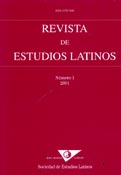Genitivo Adnominal y Determinación en Latín
DOI:
https://doi.org/10.23808/rel.v9i0.87846Palabras clave:
Genitivo; Determinación; Lingüística latina.Resumen
En el presente artículo se intenta averiguar si la secuencia sustantivo + genitivo en latín está inherentemente determinada. Para ello se establecen tres líneas de investigación: en primer lugar, la comparación de estas estructuras en otras lenguas de ámbitos cercanos; en segundo, el análisis de algunas traducciones del griego clásico al latín y, por último, el examen de distintos ejemplos del latín clásico. A partir, pues, de un estudio externo e interno, se pretende clasificar al latín entre aquellas lenguas que, con o sin artículo, interpretan regularmente como determinado un sustantivo acompañado de genitivo.
Descargas
Citas
M. BASSOLS, Sintaxis latina, Madrid 1963 (= 1956).
G. L. CAMPBELL, Concise Compendium of the World’s Languages, Londres-Nueva York 2000 (= 1991).
B. COMRIE, Universales del Lenguaje y Tipología Lingüística, Madrid 1988 (= 1981), trad. A. Ayuso.
A. ERNOUT y F. T HOMAS, Syntaxe Latine, París 2002 (= 1951).
V. GARCÍA YEBRA, Traducción: historia y teoría, Madrid 1994.
T. GIVÓN, Syntax. A functional-typological introduction, I, Amsterdam-Filadelfia 1984.
J. A. HAWKINS, Definiteness and Indefiniteness: A Study in Reference and Grammaticality Prediction, Londres 1978.
J. KRÁMSKÝ, The article and the concept of definiteness in language, La Haya 1972.
Cf. GIVÓN (1984: 407) y COMRIE (1988: 194).
R. KÜHNER y B. GERTH, Ausführliche Grammatik der griechischen Sprache, Hannover 1976 (=1898 3 ).
B. LÖFSTEDT, «Genetiv und Adjektiv», Syntactica, I 2, Lund 1942a (= 1928), pp. 107-124.
C H . LYONS, «A possessive parameter», Sheffield Working Papers in Language and Linguistics 2 (1985), pp. 98-104.
C H . LYONS, «On the origin of the Old French strong-weak possessive distinction», Transactions of the philological Society 84 (1986a), pp. 1-41.
C H . LYONS, «The syntax of English genitive constructions», JL 22 (1986b), pp. 123-143.
CH . LYONS, Definiteness, Cambridge 1999.
M. MARTÍNEZ P ASTOR, «Adjetivo y genitivo adnominal en latín. Discusión y aportaciones», Durius 2.4 (1974), pp. 221-257.
J. MAUREL, «Le paramètre «absence d’article» en latin», J. David & G. Kleiber (eds.), Déterminants: syntaxe et sémantique. Colloque International de linguistique organise par la Faculté des Lettres et Sciences Humaines de Metz. Centre d’ Analyse Syntaxique, 1984, París 1986 (Recherches linguistiques 11), pp. 203-215.
F. MÜNZER, «Orgetorix», Paulys Realencyclopädie der classischen Altertumwissenschaft, Múnich 1988 (= 1939).
H. PINKSTER, Sintaxis y semántica del latín, Madrid 1995 (= 1984), trad. y actual. M.E. Torrego & J. De La Villa.
H. ROSÉN, «The Definite Article in the Making, Nominal Constituent Order and Related Phenomena», J. Herman (ed.), Linguistic Studies on Latin, Amsterdam 1994, pp. 130-150.
L. RUBIO, Introducción a la Sintaxis Estructural del Latín, Barcelona 1989 (= 1966 I; 1976 II).
E. SCHWYZER y A. DEBRUNNER, Griechische Grammatik, Múnich 1968 4 (= 1938).
J. WACKERNAGEL, Vorlesungen über Syntax, II 2, Basilea 1957 (= 1928 2 ).
D. N. WIGTIL, «Latin Definiteness and English Articles», CW 86.6 (1993), pp. 467-481.
Descargas
Publicado
Cómo citar
Número
Sección
Licencia
Derechos de autor 2009 Revista de Estudios Latinos

Esta obra está bajo una licencia internacional Creative Commons Atribución-NoComercial-SinDerivadas 4.0.
Los originales publicados en las ediciones impresa y electrónica de esta revista son propiedad de las personas autoras de los mismos y se podrán difundir y transmitir siempre que se identifique la fuente original y la autoría en cualquier reproducción total o parcial de los mismos, y siempre que no tengan una finalidad comercial.






